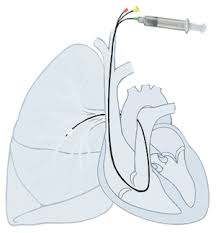A nurse is preparing to administer amoxicillin 80 mg/kg/day divided into two doses daily to a 2-year-old client who weighs 10 kg (22 lb). Available is amoxicillin suspension 400 mg/5 mL. How many mL of amoxicillin should the nurse administer per dose?
(Round the answer to the nearest whole number. Use a leading zero if it applies. Do not use a trailing zero.)
The Correct Answer is ["5"]
The dosage is 80 mg/kg/day, and the child weighs 10 kg.
80 mg/kg/day * 10 kg = 800 mg/day
Since this is divided into two doses per day:
800 mg/day ÷ 2 doses = 400 mg per dose
Now, let's determine the amount of amoxicillin suspension needed for each dose:
The amoxicillin suspension is 400 mg per 5 mL.
400 mg per dose ÷ 400 mg per 5 mL = 5 mL per dose
Therefore, the nurse should administer 5 mL of amoxicillin suspension per dose to the 2-year-old client weighing 10 kg.
Nursing Test Bank
Naxlex Comprehensive Predictor Exams
Related Questions
Correct Answer is C
Explanation
Choice A Reason:
"You will have your dressing removed 12 hours after the procedure." This information might be pertinent, but it's not the most critical aspect to highlight in pre-procedural teaching for a 10-year-old child.
Choice B Reason:
"You will be on bed rest for 2 days after the procedure." While some rest might be recommended after the procedure, stating a specific duration of bed rest might cause unnecessary anxiety for the child. It's important to provide accurate information without causing undue stress.
Choice C Reason:
"You will need to keep your leg straight for 8 hours following the procedure." This instruction is relevant for post-procedural care after arterial cardiac catheterization. It's important to keep the leg straight to prevent bleeding from the catheter insertion site. Explaining this in child-friendly language would be beneficial.
Choice D Reason:
"You will be on a clear liquid diet for 24 hours following the procedure." While dietary instructions might be given after the procedure, specifying a clear liquid diet might not be the most crucial information to emphasize in pre-procedural teaching for a 10-year-old child.

Correct Answer is B
Explanation
Choice A Reason:
Moisten the mucosa with lemon glycerin swabs. Lemon glycerin swabs might be too acidic and can cause irritation or discomfort in oral ulcers. Using them could exacerbate the toddler's condition.
Choice B Reason:
Cleanse the gums with saline-soaked gauze. This action can help maintain oral hygiene and reduce the risk of infection in the oral ulcers. Saline is gentle and can help keep the affected area clean without causing further irritation.
Choice C Reason:
Administer oral viscous lidocaine. Lidocaine is a local anesthetic that may be used in some cases for pain relief, but its use in oral ulcers for toddlers might not be recommended due to potential risks and concerns about ingestion, especially in young children.
Choice D Reason:
Schedule routine oral care every hour. While oral care is essential, performing it too frequently (every hour) might cause more discomfort and irritation to the already sensitive oral ulcers. Gentle, regular care is important, but excessive cleaning can be detrimental.
Whether you are a student looking to ace your exams or a practicing nurse seeking to enhance your expertise , our nursing education contents will empower you with the confidence and competence to make a difference in the lives of patients and become a respected leader in the healthcare field.
Visit Naxlex, invest in your future and unlock endless possibilities with our unparalleled nursing education contents today
Report Wrong Answer on the Current Question
Do you disagree with the answer? If yes, what is your expected answer? Explain.
Kindly be descriptive with the issue you are facing.
